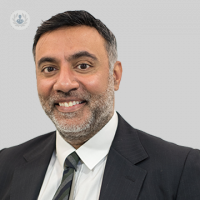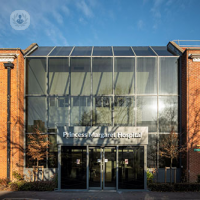What are intraocular lenses?
Intraocular lenses (IOLs) are lenses used to replace damaged lenses. They are placed in the eye so that the light that enters goes to the retina.

There are two types of intraocular lenses:
- Phakic: these are placed without having to take the lens out.
- Pseudophakic: these are placed after the lens is removed. An example is during cataract surgery.
They tend to be made from flexible and foldable material which are the same size as the original lens. The lenses implanted can also be multifocal intraocular lenses or toric intraocular lenses.
The procedure is normally carried out under topical anaesthetic which is administered in drops. It is a painless procedure that is done on an outpatient basis, and doesn’t require the eye to be covered for longer than half an hour afterwards.
Why would you do it?
Intraocular lenses tend to be used in cases of cataracts, myopia, or other visual disorders. Another reason intraocular lenses are used is for patients without presbyopia. This preserves the lens and corrects different refractive errors. The patient can return to normal life shortly after surgery.
What does it involve?
Intraocular lenses are implanted in the eye during cataract surgery to replace the natural lens.
How to prepare for it
An ophthalmologist will run a series of tests to determine patient suitability and what the best option is according to their needs.
The depth of the anterior chamber is measured to ensure that the intraocular lens fits the eye without altering anatomical structures.
Post-operative care
The post-operative period is short, and the patient can return to normal life and continue with daily activities without any issues.
Complete bed rest is not necessary after the procedure, just take care to avoid traumas and apply eye drops. The application of the drops will depend on the procedure that has been done. They tend to be applied two to four times a day for the three weeks following the surgery.
Alternative treatments
Laser refractive surgery may be considered. This type of surgery reshapes the cornea (which is responsible for our vision) using a laser. Corneal tissues are lifted to do this, they will be replaced after surgery and do not require stitches.
10-05-2017 09-21-2023Lens replacement (intraocular lenses)
What are intraocular lenses?
Intraocular lenses (IOLs) are lenses used to replace damaged lenses. They are placed in the eye so that the light that enters goes to the retina.

There are two types of intraocular lenses:
- Phakic: these are placed without having to take the lens out.
- Pseudophakic: these are placed after the lens is removed. An example is during cataract surgery.
They tend to be made from flexible and foldable material which are the same size as the original lens. The lenses implanted can also be multifocal intraocular lenses or toric intraocular lenses.
The procedure is normally carried out under topical anaesthetic which is administered in drops. It is a painless procedure that is done on an outpatient basis, and doesn’t require the eye to be covered for longer than half an hour afterwards.
Why would you do it?
Intraocular lenses tend to be used in cases of cataracts, myopia, or other visual disorders. Another reason intraocular lenses are used is for patients without presbyopia. This preserves the lens and corrects different refractive errors. The patient can return to normal life shortly after surgery.
What does it involve?
Intraocular lenses are implanted in the eye during cataract surgery to replace the natural lens.
How to prepare for it
An ophthalmologist will run a series of tests to determine patient suitability and what the best option is according to their needs.
The depth of the anterior chamber is measured to ensure that the intraocular lens fits the eye without altering anatomical structures.
Post-operative care
The post-operative period is short, and the patient can return to normal life and continue with daily activities without any issues.
Complete bed rest is not necessary after the procedure, just take care to avoid traumas and apply eye drops. The application of the drops will depend on the procedure that has been done. They tend to be applied two to four times a day for the three weeks following the surgery.
Alternative treatments
Laser refractive surgery may be considered. This type of surgery reshapes the cornea (which is responsible for our vision) using a laser. Corneal tissues are lifted to do this, they will be replaced after surgery and do not require stitches.
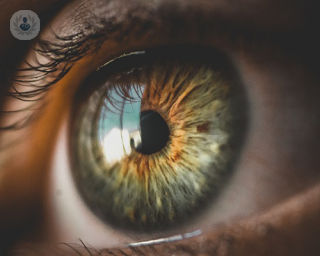

Aftercare advice: What to expect following cataract or lens replacement surgery
By Mr Jagmohan Chawla
2025-01-29
Highly experienced consultant ophthalmic and oculoplastic surgeon Mr Jagmohan Chawla shares his expert advice on aftercare following cataract or refractive lens exchange surgery in this informative article for patients. See more


Fine-tuning: can implantable lenses be adjusted after cataract surgery?
By Mr Kaykhosrov Manuchehri
2025-01-29
After cataract surgery, there are various options for the type of implanted lens you can have. We asked expert ophthalmologist, Mr Kaykhosrov Manuchehri, if once the new lens implant is in the eye, can it be adjusted or changed? See more
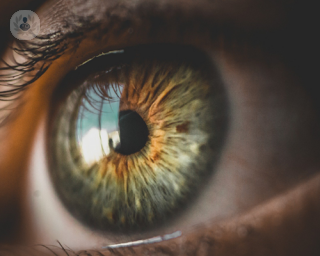

Premium lenses for cataract surgery
By Ms Stacey Strong
2025-01-29
Cataract surgery is one of the most common and effective procedures for restoring vision, especially in older adults. Traditionally, the standard lens implant, or intraocular lens (IOL), used in cataract surgery restores vision at a single distance, usually for distance vision. However, premium lenses offer advanced solutions, enabling clearer vision at multiple distances and reducing dependence on glasses. See more
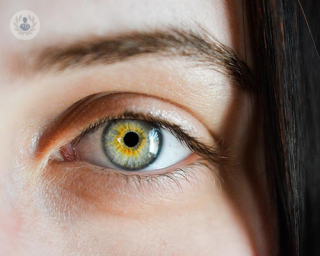

Secondary intraocular lens replacement: An expert's guide
By Ms Evgenia (Jen) Anikina
2025-01-29
Ms Evgenia Anikina is a highly-experienced consultant vitreoretinal surgeon based in London. In her latest online article, Ms Anikina offers her expert insight into secondary lens replacements, an operation that can greatly improve the patient’s quality of life. See more
Experts in Lens replacement (intraocular lenses)
-
Professor Kin Sheng Lim
OphthalmologyExpert in:
- PreserFlo™
- Lens replacement (intraocular lenses)
- Glaucoma
- Glaucoma surgery
- Laser eye surgery
- Cataracts
-
Mr Vik Sharma
OphthalmologyExpert in:
- Glaucoma
- Cataracts
- Glaucoma surgery
- Lens replacement (intraocular lenses)
- Ocular hypertension
- Blepharoplasty
-
Mr Scott Robbie
OphthalmologyExpert in:
- Cataracts
- ICL implants
- Laser eye surgery
- YAG laser capsulotomy
- Lens replacement (intraocular lenses)
- Refractive surgery
-
Mr Alexander Ionides
OphthalmologyExpert in:
- Cataract surgery
- Lens replacement (intraocular lenses)
- LASIK
- Laser eye surgery
- Cataracts
- Multifocal contact lenses
-
Professor Sunil Shah
OphthalmologyExpert in:
- Cataracts
- Corneal transplant
- Refractive surgery
- Laser eye surgery
- Lens replacement (intraocular lenses)
- Dry eye
- See all

The Princess Margaret Hospital - part of Circle Health Group
The Princess Margaret Hospital - part of Circle Health Group
Osborne Rd, Windsor SL4 3SJ
No existe teléfono en el centro.
By using the telephone number provided by TOP DOCTORS, you automatically agree to let us use your phone number for statistical and commercial purposes. For further information, read our Privacy Policy
Top Doctors

Guy’s and St Thomas’ Private Healthcare
Guy’s and St Thomas’ Private Healthcare
Guy’s Hospital, Great Maze Pond
No existe teléfono en el centro.
By using the telephone number provided by TOP DOCTORS, you automatically agree to let us use your phone number for statistical and commercial purposes. For further information, read our Privacy Policy
Top Doctors

The Shelburne Hospital - part of Circle Health Group
The Shelburne Hospital - part of Circle Health Group
Queen Alexandra Rd, High Wycombe HP11 2TR
No existe teléfono en el centro.
By using the telephone number provided by TOP DOCTORS, you automatically agree to let us use your phone number for statistical and commercial purposes. For further information, read our Privacy Policy
Top Doctors
-
The Princess Margaret Hospital - part of Circle Health Group
Osborne Rd, Windsor SL4 3SJ, WindsorExpert in:
- Brachytherapy
- Cardiology
- General Surgery
- Orthopaedic surgery
- Robotic Surgery
- Dermatology
-
Guy’s and St Thomas’ Private Healthcare
Guy’s Hospital, Great Maze Pond, SE1 South Bank LondonExpert in:
- Allergy
- Cardiology
- General Surgery
- Maxillofacial Surgery
- Thoracic Surgery
- Maternity care
-
The Shelburne Hospital - part of Circle Health Group
Queen Alexandra Rd, High Wycombe HP11 2TR, High WycombeExpert in:
- Abdominal ultrasound
- Allergies Ophthalmological
- Clinical analysis
- Hip
- Cataracts
- Full Body Check
- See all
- Most viewed diseases, medical tests, and treatments
- Visual impairment
- Diabetic retinopathy
- Retina
- Presbyopia
- Nystagmus
- Myopia
- Hyperopia (farsightedness)
- Eye examination
- Blepharitis
- Astigmatism


